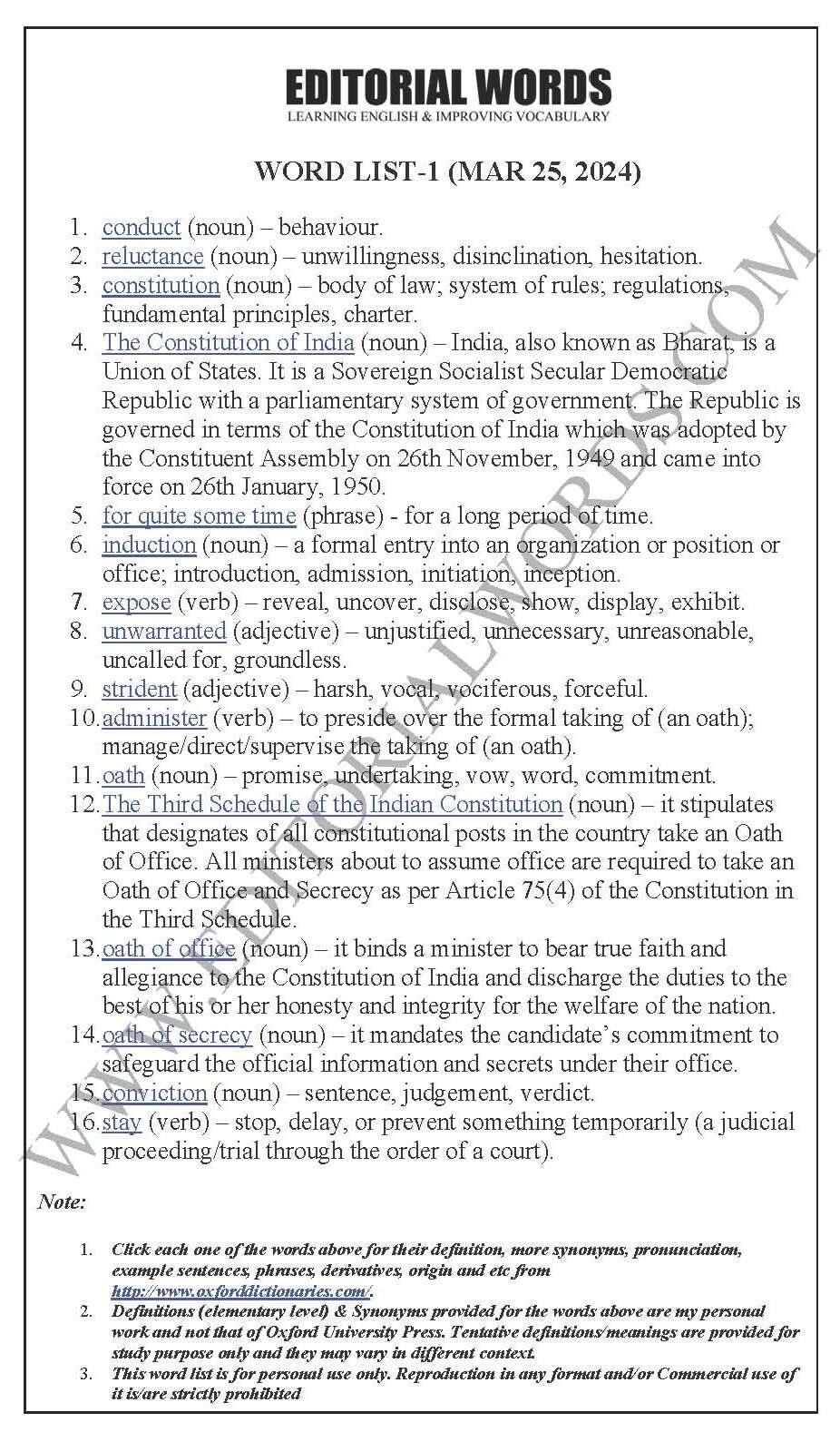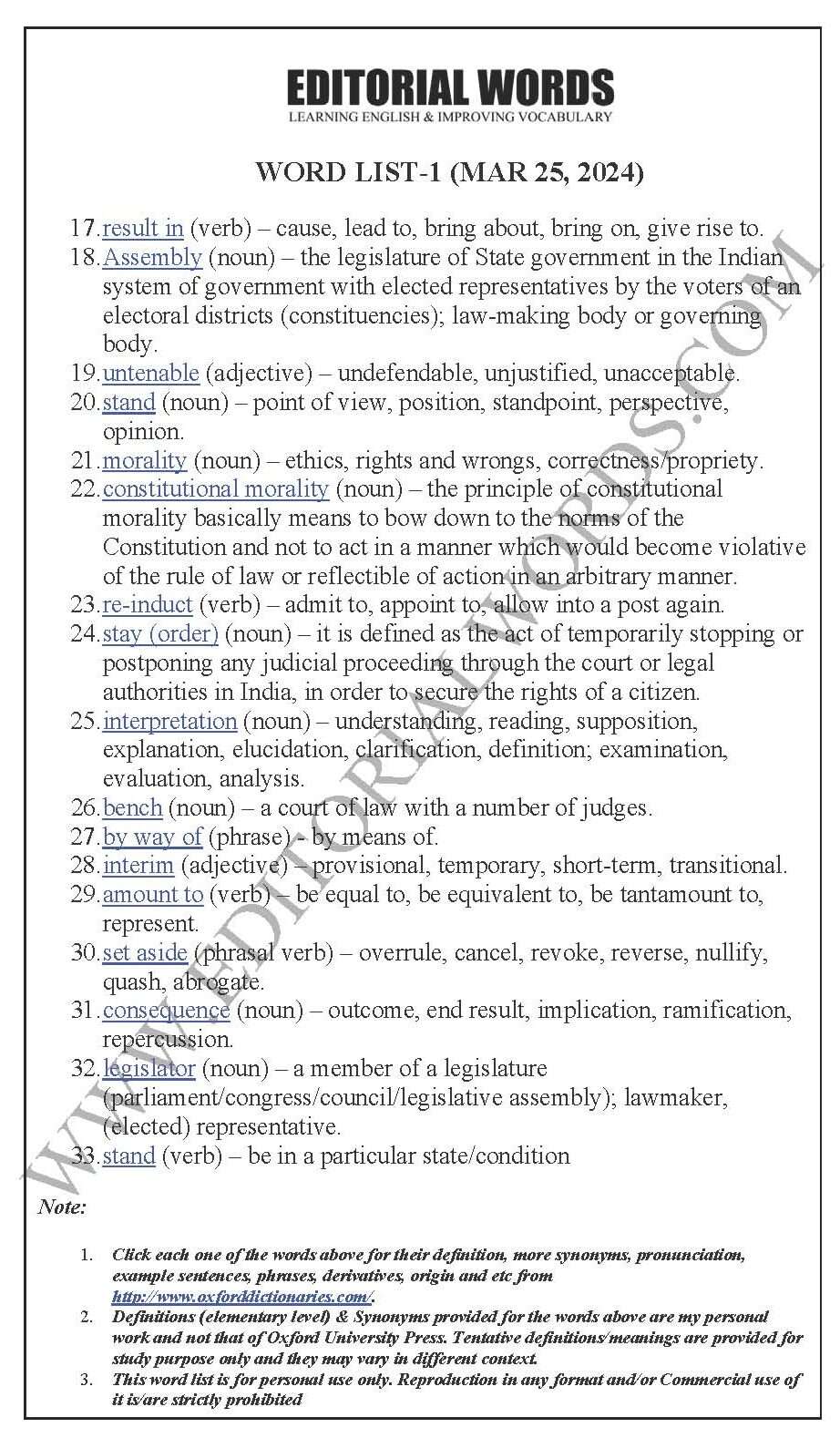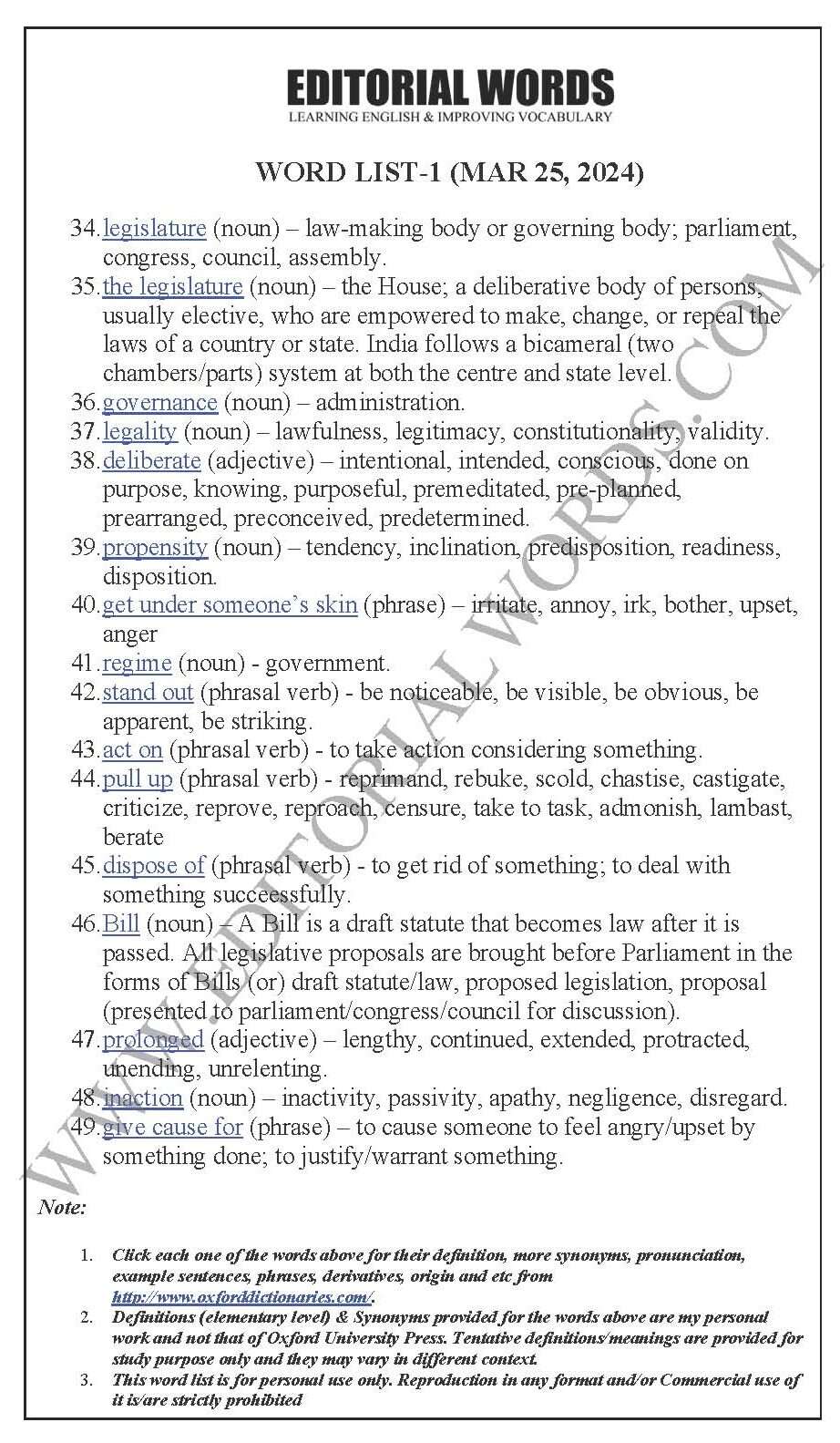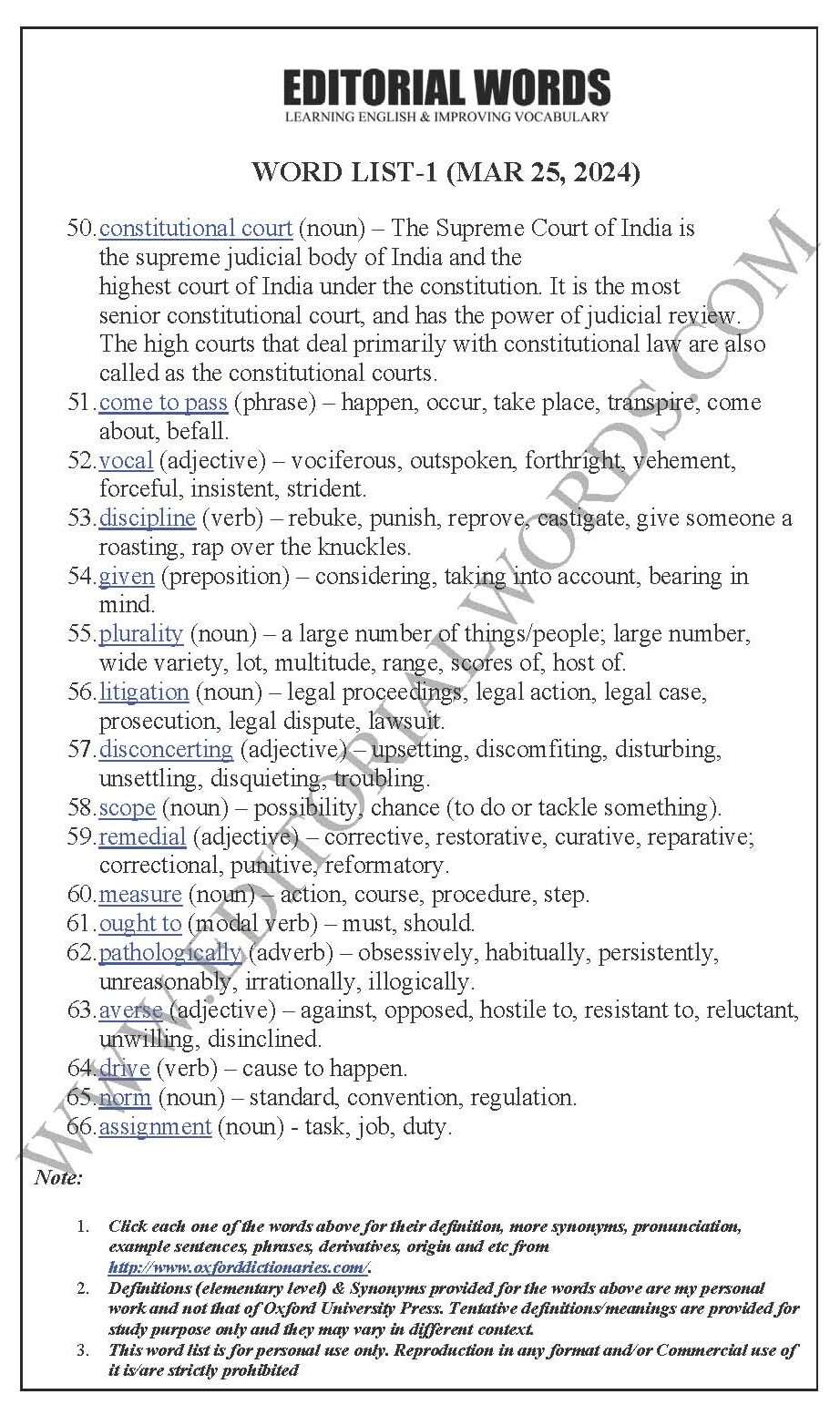The Hindu Editorial (Questionable conduct) – Mar 25, 2024
To read this article, click “The Hindu”.
This preview is provided here with permission.
Courtesy: The Hindu
The Hindu Editorial (Questionable conduct) – Mar 25, 2024:
- conduct (noun) – behaviour.
- reluctance (noun) – unwillingness, disinclination, hesitation.
- constitution (noun) – body of law; system of rules; regulations, fundamental principles, charter.
- The Constitution of India (noun) – India, also known as Bharat, is a Union of States. It is a Sovereign Socialist Secular Democratic Republic with a parliamentary system of government. The Republic is governed in terms of the Constitution of India which was adopted by the Constituent Assembly on 26th November, 1949 and came into force on 26th January, 1950.
- for quite some time (phrase) – for a long period of time.
- induction (noun) – a formal entry into an organization or position or office; introduction, admission, initiation, inception.
- expose (verb) – reveal, uncover, disclose, show, display, exhibit.
- unwarranted (adjective) – unjustified, unnecessary, unreasonable, uncalled for, groundless.
- strident (adjective) – harsh, vocal, vociferous, forceful.
- administer (verb) – to preside over the formal taking of (an oath); manage/direct/supervise the taking of (an oath).
- oath (noun) – promise, undertaking, vow, word, commitment.
- The Third Schedule of the Indian Constitution (noun) – it stipulates that designates of all constitutional posts in the country take an Oath of Office. All ministers about to assume office are required to take an Oath of Office and Secrecy as per Article 75(4) of the Constitution in the Third Schedule.
- oath of office (noun) – it binds a minister to bear true faith and allegiance to the Constitution of India and discharge the duties to the best of his or her honesty and integrity for the welfare of the nation.
- oath of secrecy (noun) – it mandates the candidate’s commitment to safeguard the official information and secrets under their office.
- conviction (noun) – sentence, judgement, verdict.
- stay (verb) – stop, delay, or prevent something temporarily (a judicial proceeding/trial through the order of a court).
- result in (verb) – cause, lead to, bring about, bring on, give rise to.
- Assembly (noun) – the legislature of State government in the Indian system of government with elected representatives by the voters of an electoral districts (constituencies); law-making body or governing body.
- untenable (adjective) – undefendable, unjustified, unacceptable.
- stand (noun) – point of view, position, standpoint, perspective, opinion.
- morality (noun) – ethics, rights and wrongs, correctness/propriety.
- constitutional morality (noun) – the principle of constitutional morality basically means to bow down to the norms of the Constitution and not to act in a manner which would become violative of the rule of law or reflectible of action in an arbitrary manner.
- re-induct (verb) – admit to, appoint to, allow into a post again.
- stay (order) (noun) – it is defined as the act of temporarily stopping or postponing any judicial proceeding through the court or legal authorities in India, in order to secure the rights of a citizen.
- interpretation (noun) – understanding, reading, supposition, explanation, elucidation, clarification, definition; examination, evaluation, analysis.
- bench (noun) – a court of law with a number of judges.
- by way of (phrase) by means of.
- interim (adjective) – provisional, temporary, short-term, transitional.
- amount to (verb) – be equal to, be equivalent to, be tantamount to, represent.
- set aside (phrasal verb) – overrule, cancel, revoke, reverse, nullify, quash, abrogate.
- consequence (noun) – outcome, end result, implication, ramification, repercussion.
- legislator (noun) – a member of a legislature (parliament/congress/council/legislative assembly); lawmaker, (elected) representative.
- stand (verb) – be in a particular state/condition
- legislature (noun) – law-making body or governing body; parliament, congress, council, assembly.
- the legislature (noun) – the House; a deliberative body of persons, usually elective, who are empowered to make, change, or repeal the laws of a country or state. India follows a bicameral (two chambers/parts) system at both the centre and state level.
- governance (noun) – administration.
- legality (noun) – lawfulness, legitimacy, constitutionality, validity.
- deliberate (adjective) – intentional, intended, conscious, done on purpose, knowing, purposeful, premeditated, pre-planned, prearranged, preconceived, predetermined.
- propensity (noun) – tendency, inclination, predisposition, readiness, disposition.
- get under someone’s skin (phrase) – irritate, annoy, irk, bother, upset, anger
- regime (noun) – government.
- stand out (phrasal verb) – be noticeable, be visible, be obvious, be apparent, be striking.
- act on (phrasal verb) – to take action considering something.
- pull up (phrasal verb) – reprimand, rebuke, scold, chastise, castigate, criticize, reprove, reproach, censure, take to task, admonish, lambast, berate
- dispose of (phrasal verb) – to get rid of something; to deal with something succeessfully.
- Bill (noun) – A Bill is a draft statute that becomes law after it is passed. All legislative proposals are brought before Parliament in the forms of Bills (or) draft statute/law, proposed legislation, proposal (presented to parliament/congress/council for discussion).
- prolonged (adjective) – lengthy, continued, extended, protracted, unending, unrelenting.
- inaction (noun) – inactivity, passivity, apathy, negligence, disregard.
- give cause for (phrase) – to cause someone to feel angry/upset by something done; to justify/warrant something.
- constitutional court (noun) – The Supreme Court of India is the supreme judicial body of India and the highest court of India under the constitution. It is the most senior constitutional court, and has the power of judicial review. The high courts that deal primarily with constitutional law are also called as the constitutional courts.
- come to pass (phrase) – happen, occur, take place, transpire, come about, befall.
- vocal (adjective) – vociferous, outspoken, forthright, vehement, forceful, insistent, strident.
- discipline (verb) – rebuke, punish, reprove, castigate, give someone a roasting, rap over the knuckles.
- given (preposition) – considering, taking into account, bearing in mind.
- plurality (noun) – a large number of things/people; large number, wide variety, lot, multitude, range, scores of, host of.
- litigation (noun) – legal proceedings, legal action, legal case, prosecution, legal dispute, lawsuit.
- disconcerting (adjective) – upsetting, discomfiting, disturbing, unsettling, disquieting, troubling.
- scope (noun) – possibility, chance (to do or tackle something).
- remedial (adjective) – corrective, restorative, curative, reparative; correctional, punitive, reformatory.
- measure (noun) – action, course, procedure, step.
- ought to (modal verb) – must, should.
- pathologically (adverb) – obsessively, habitually, persistently, unreasonably, irrationally, illogically.
- averse (adjective) – against, opposed, hostile to, resistant to, reluctant, unwilling, disinclined.
- drive (verb) – cause to happen.
- norm (noun) – standard, convention, regulation.
- assignment (noun) – task, job, duty.
Note :
1. Click each one of the words above for their definition, more synonyms, pronunciation, example sentences, phrases, derivatives, origin and etc. from http://www.oxforddictionaries.com/.
2. Definitions (elementary level) & Synonyms provided for the words above are my personal work and not that of Oxford University Press. Tentative definitions/meanings are provided for study purposes only and they may vary in a different context.
3. This word list is for personal use only. Reproduction in any format and/or Commercial use of it is/are strictly prohibited.
The Hindu Editorial (Questionable conduct) – Mar 25, 2024:




“Phrasal Verbs” We Learnt Last Week
“Idioms & Phrases” We Learnt Last Week
“Important Definitions” We Learnt Last Week
Recent Word Lists For The Hindu Editorial Articles

The conduct of the Tamil Nadu Governor, R.N. Ravi, has been constitutionally questionable for quite some time now. In the latest instance, his refusal to allow the re-induction of… For further reading, visit “The Hindu”. Below is today’s word list-1 for The Hindu Editorial (Questionable conduct) – Mar 25, 2024.